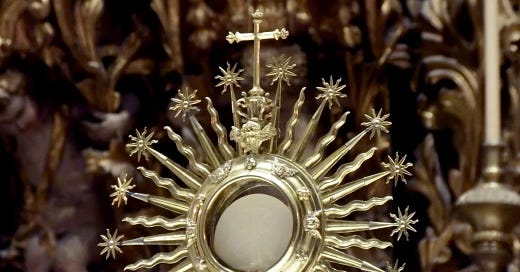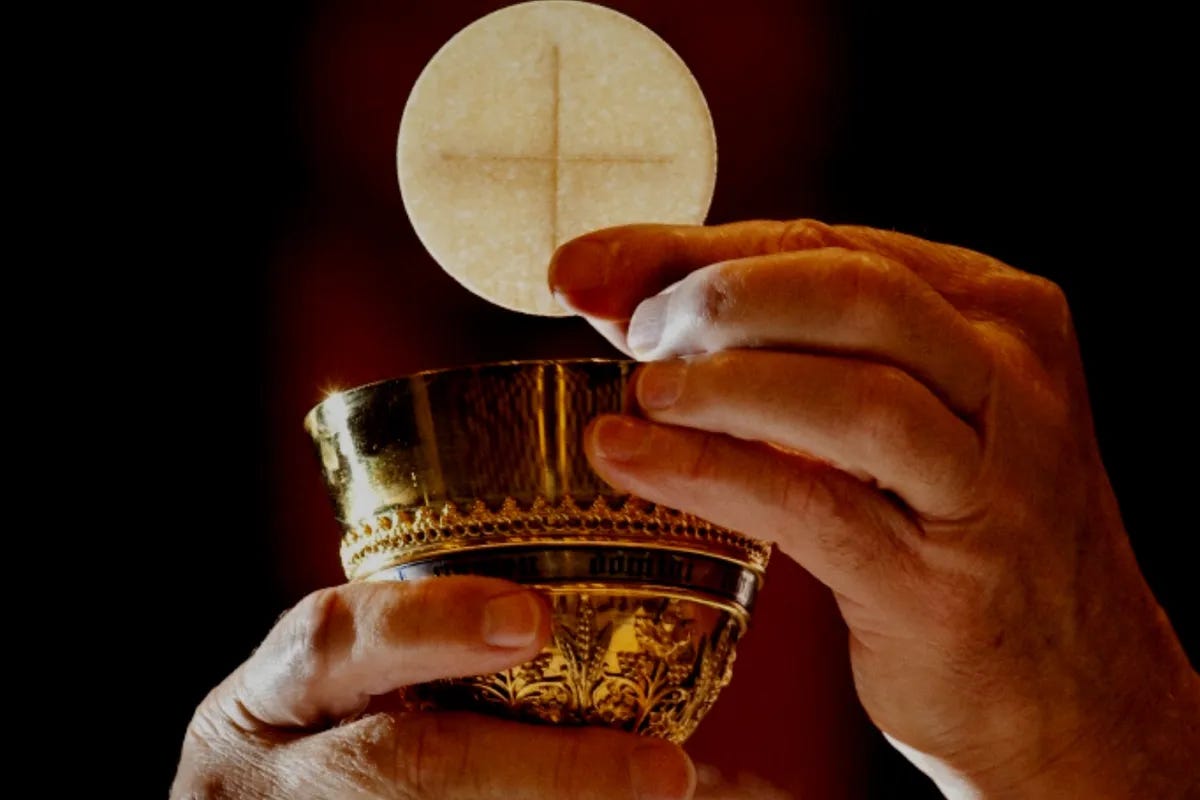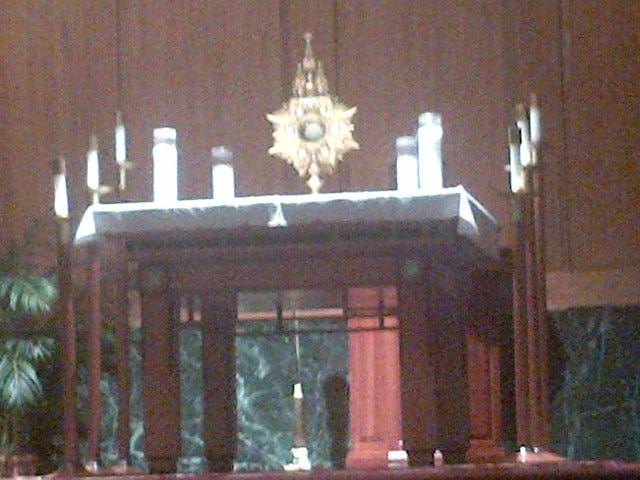For the sake of this article, I would like you to take it for granted that transubstantiation is a real and true phenomenon. That, as is central to the Catholic faith, at Mass a priest transforms a host, a piece of unleavened bread, into the body, blood, soul, and divinity of Jesus Christ himself. I am not here trying to write a treatise on transubstantiation as I am neither that learned nor full of myself to attempt such a thing. But I am trying to impart to any interested reader a sense of what this means in my life as an ordinary, believing Catholic. Thus, I’m not asking you to believe what I believe, but to step into my place, just for the time it takes to read this.
At Mass, when it is time for the consecration and the priest lifts up the host, it happens without a flash of lightning, nor cracks of thunder, nor earthquakes, nor explosions like the splitting of an atom. It’s accompanied by silence or often the mere jiggles of a tiny bell rung by an altar boy. But I know then that while the little white disk of bread’s physical properties remain the same, its essence has been transformed into someone I’ve known my entire life. Someone who is at the same time, my God, my Savior, my King, my Judge, my adopted brother, my best friend, and the one I pray to for everything. (I also ask his friends and even his mother to put in a word for me too—it can’t hurt!) But I can’t wrap my limited nut-sized brain around that, so I get up in order to take and eat him.
I try to say a prayer as I’m processing up to receive communion, but more often than I’d like to admit my mind’s off on ridiculous things. It’s usually something like this… ‘Am I taller than that woman in front of me? Boy, she’s tall! Wow, that’d make her over six feet! Huh, that guy in front of me is kneeling to receive by the tongue. Yep, that is the best way to do it. I’d feel funny to just start doing it that way. I mean, if we all were told to do it, then I’d do it that way.’ “Body of Christ,” the priest states as he places a host in my palm. “Amen,” I reply. I often note to myself how wonderful the taste of bread really is as I savor the flavor. He made it so easy for us to take him into our bodies. So many of his followers did not understand this. Many stopped following him when he said that they must eat his flesh and drink his blood if they wanted eternal life. They didn’t trust him enough to find out how he would go about giving us his flesh to eat. Those who gave him the benefit of the doubt were the first to receive this bread of life from the man himself, at the Last Supper.
So, I’ve taken him inside me and I have him there until my body has broken down the transformed host and digested it. I only have so long to talk to him, and I almost never make good use of that time. Like, I see the tall woman returning to her seat in front of me. ‘Yep, I don’t think she’s quite six feet—I think if I stood real straight I’d be the same height…’ Then I catch myself. ‘There I go again thinking about stupid stuff. This reminds me of an episode of “Three’s Company,” where Jack is dating a…’ Then I reproach myself—'There I go again! What a wretch I am, Lord—how do you put up with me?’ As I kneel, I usually start my prayers thanking him for all that he has given me—my wife, my kids, my parents, my life, though I don’t deserve it in any way. ‘And that thing I am praying about, that thing that’s bothering me, well, you know all about it anyway. I really want this to happen, and I know I don’t know that’s your will or not, but if it is, let it be!’ (I really have a way with words when I pray!) There are times when I get feedback—an instant of pure joy, of insight, of love, but most of the time, not. I blame myself for not being properly disposed. But then I remind myself that emotions and instant spiritual fruits are not the point of it at all. I have followed his command and received him so that I might have eternal life—whether I feel it at the time or not is irrelevant.
I have more time to be with him during Adoration. Many parishes around the world have perpetual adoration in a chapel in their church where there is always a worshiper present with the host exposed inside a monstrance. While not perpetual, my church has an adoration chapel that you can go to any hour of the day and night. They also have adoration on Tuesdays, where the monstrance is placed on the main altar, and you can come and do your Holy Hour. During that time, you can pray or read the scriptures or some other holy, spiritual reading. I do this once a week. They say that it is a good practice to divide up your prayers by making prayer petitions for yourself and others, by asking for his mercy and forgiveness, by giving thanks and gratitude, and giving him the love and praise he is due.
I might then read from my book:
“Give me, O Lord, heavenly wisdom, that I may learn to seek Thee above all things and to find Thee; to relish Thee above all things and to love Thee; and to understand all other things, even as they are, according to the order of Thy wisdom. Grant me prudently to avoid the flatterer, and patiently to bear with him that opposeth me; for this is great wisdom, not to be carried by every wind of words, nor to give ear to the wicked flattering Siren; for thus do we go safely on in the way we have begun.” ― Thomas à Kempis, The Imitation of Christ
I say my prayers, and sometimes I even try to listen. But I find it nearly impossible to stop my internal monologue. Have you ever tried to stop yourself from thinking, from talking inside your head, so you can listen? ‘I’m stopping now, I’m trying to listen. Shut up. Maybe if I try to repeat a word. I try saying his name. Jesus. Jesus. Jeeeessssuuuussss. JJJJJJJJJJJEEEEEEESSSSSUUUUSSSSS. Maybe if I just make a tone in my head, eeeeeeeeeeeeeeeeeeeeeeeeeeee. I stopped for a minute. Darn, I started up again.’ I go back to praying or just imagining something in his life, his face. But then a scene from television program could take over, even sometimes something offensive flashes in. ‘I am such a jerk, Lord. How can you put up with me?’
“Jesus: ‘I am He who, in an instant, can raise up the humble man’s mind to a better understanding of the principles of eternal truth than if he spent ten years studying them in a university. When I teach, I use neither words nor sounds. I teach without confusing minds, without encouraging a desire for honors, and without conflicting arguments.’” ― Thomas à Kempis
I gaze upon him and am sometimes startled by the simplicity of the small white disk up there on the altar. I ask you the reader to think about this. As an ordinary nobody, I cannot get a meeting with anyone of importance in the world. I will likely never meet a president, the King of England, nor the Pope. And even if I try, there will have to be something of great importance that I can offer them to be seen. But, the Creator of the Universe, my God, my Savior, my King, my Judge, my adopted brother, my best friend, and the one I pray to for everything is right there in front of me. And, he is the unchanging God of all time. In a way he is present here as he is present across town in another parish’s tabernacle as he is present across time, now and in the Fifth Century as he is present in the Twenty-Fourth Century. I am staring into all of eternity. He is timeless and everywhere, but I have him in front of me, right here, right now. And I have his ear. Again, I can’t wrap my mind around that, but I believe it.
“If, with a single glance, you could see everything in the world spread out before your eyes, how fruitless a sight that would be! Raise your eyes to God on high and pray for your sins and deficiencies.” ― Thomas à Kempis
Why look like a humble piece of bread, you may ask? It hit me one time while staring at him. Interfacing with God can be a risky, tricky business for us fallen creatures. No one in a state of imperfection can enter the Kingdom of Heaven. In Exodus, Chapter 34, when speaking on behalf of Israelites before God on Mount Sinai, Moses’ face would become radiant. So much so, when the other Israelites saw Moses, they were afraid to come near him. He had to put a veil over his face when he went back into public. So now we have something greater in our midst with Christ as our intercessor to the Father. Because he has humbled himself, we may come before him without dying. The little disk in the appearance of bread is a mercy and a great gift to us.
I close with a poem.
Gazing into Eternal Life
A communion wafer, large, white, thin and round,
I gaze upon you steadily; my spirit reclines aground.
Up upon a monstrance, adorned in wavering gold,
You, a humble edible disk, static and blankly cold.
Nothing moves, nothing stirs, no matter how I stare,
I see only simplicity, a plainness beyond compare.
Then at once you conquer me, unchanging God of all,
You come to commune with us, imprisoned by the fall.
I can look upon my Lord without gasping for my breath,
Imperfect, I can come near without fear of instant death.
Now I comprehend, you appear as a simple piece of bread,
So as to save us from the endless fate of the unjust dead.
I’m done now—you may now stop taking it for granted that transubstantiation is a real and true phenomenon.







